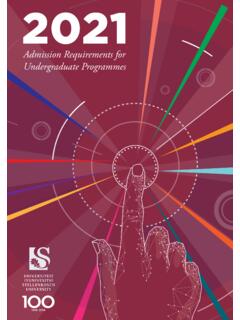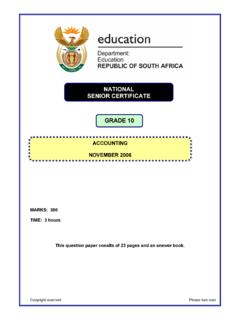Transcription of CAPS Grade R Mathematics - Educanda
1 Grade R CURRICULUM AND ASSESSMENT POLICY STATEMENT (CAPS) FOUNDATION PHASE Mathematics RECEPTION YEAR 1 TABLE OF CONTENTS 1. SECTION 1: national CURRICULUM AND ASSESSMENT POLICY STATEMENT FOR Mathematics FOUNDATION PHASE 2 Background 2 Overview 2 General aims of the South African curriculum 3 Time allocations 4 2. SECTION 2: Mathematics : AIMS, SKILLS AND CONTENT 6 Introduction What is Mathematics ? 6 6 Specific aims 6 Specific skills 6 Focus of content areas 7 Weighting of content areas 8 Mathematics in the foundation phase 8 Suggested guidelines for classroom management 8 Learners with barriers to learning Mathematics 10 Mental Mathematics 10 Grade R 10 Grade R daily programme 13 Recommended resources 14 3 SECTION 3.
2 CONTENT AREAS OVERVIEW GRADES R 3 15 Introduction 15 Specification of content to show progression 15 Foundation Phase (Grades R 3) overview 15 Number, operations and relationships 16 Patterns, functions and Algebra 21 Space and shape 22 Measurement 25 Data handling 29 Content clarification 31 Allocation of teaching time for Mathematics Grades R 3 31 Sequencing and pacing of content 31 Lesson plans topic allocation per term 32 Grade R term overview 34 Grade 1 term overview 49 Grade 2 term overview 61 Grade 3 term overview 73 Clarification notes with teaching guidelines Grade R term 1 89 Grade R term 2 184 Grade R term 3 285 Grade R term 4 4 SECTION 4.
3 ASSESSMENT GUIDELINES Introduction 404 2 Informal or daily assessment 404 Recording and Reporting Exemplar assessment tasks for Grade R 410 3 FINAL Background The national Curriculum Statement Grades R 12 (NCS) stipulates policy on curriculum and assessment in the schooling sector. To improve implementation, the national Curriculum Statement was amended, with the amendments coming into effect in January 2012. A single comprehensive Curriculum and Assessment Policy document was developed for each subject to replace Subject Statements, Learning Programme Guidelines and Subject Assessment Guidelines in Grades R - 12.
4 Overview (a) The national Curriculum Statement Grades R 12 (January 2012) represents a policy statement for learning and teaching in South African schools and comprises the following: (i) national Curriculum and Assessment Policy Statements for each approved school subject; (ii) The policy document, national policy pertaining to the programme and promotion requirements of the national Curriculum Statement Grades R 12; and (iii) The policy document, national Protocol for Assessment Grades R 12 (January 2012). (b) The national Curriculum Statement Grades R 12 (January 2012) replaces the two current national curricula statements, namely the (i) Revised national Curriculum Statement Grades R - 9, Government Gazette No.
5 23406 of 31 May 2002, and (ii) national Curriculum Statement Grades 10 - 12 Government Gazettes, No. 25545 of 6 October 2003 and No. 27594 of 17 May 2005. (c) The national curriculum statements contemplated in subparagraphs (a) and (b) comprise the following policy documents which will be incrementally repealed by the national Curriculum Statement Grades R 12 (January 2012) during the period 2012-2014: (i) The Learning Area/Subject Statements, Learning Programme Guidelines and Subject Assessment Guidelines for Grades R - 9 and Grades 10 12; SECTION 1 national CURRICULUM AND ASSESSMENT POLICY STATEMENT (CAPS) FOR Mathematics FOUNDATION PHASE FOUNDATION PHASE Mathematics Grade R-3 4 (ii) The policy document, national Policy on assessment and qualifications for schools in the General Education and Training Band d, promulgated in Government Notice No.
6 124 in Government Gazette No. 29626 of 12 February 2007; (iii) The policy document, the national senior certificate : A qualification at Level 4 on the national Qualifications Framework (NQF), promulgated in Government Gazette of 20 July 2005; (iv) The policy document, An addendum to the policy document, the national senior certificate : A qualification at Level 4 on the national Qualifications Framework (NQF), regarding learners with special needs, published in Government Gazette, of 11 December 2006, is incorporated in the policy document, national policy pertaining to the programme and promotion requirements of the national Curriculum Statement Grades R 12.
7 And (v) The policy document, An addendum to the policy document, the national senior certificate : A qualification at Level 4 on the national Qualifications Framework (NQF), regarding the national Protocol for Assessment (Grades R 12), promulgated in Government Notice in Government Gazette No. 29467 of 11 December 2006. (c) The policy document, national policy pertaining to the programme and promotion requirements of the national Curriculum Statement Grades R 12, and the sections on the Curriculum and Assessment Policy as contemplated in Chapters 2, 3 and 4 of this document constitute the norms and standards of the national Curriculum Statement Grades R 12.
8 It will therefore, in terms of section 6A of the South African Schools Act, 1996 (Act No. 84 of 1996,) form the basis for the Minister of Basic Education to determine minimum outcomes and standards, as well as the processes and procedures for the assessment of learner achievement to be applicable to public and independent schools. General aims of the South African Curriculum (a) The national Curriculum Statement Grades R - 12 gives expression to the knowledge, skills and values worth learning in South African schools. This curriculum aims to ensure that children acquire and apply knowledge and skills in ways that are meaningful to their own lives.
9 In this regard, the curriculum promotes knowledge in local contexts, while being sensitive to global imperatives. (b) The national Curriculum Statement Grades R - 12 serves the purposes of: equipping learners, irrespective of their socio-economic background, race, gender, physical ability or intellectual ability, with the knowledge, skills and values necessary for self-fulfilment, and meaningful participation in society as citizens of a free country; 5 providing access to higher education; facilitating the transition of learners from education institutions to the workplace; and providing employers with a sufficient profile of a learner s competences.
10 (c) The national Curriculum Statement Grades R - 12 is based on the following principles: Social transformation: ensuring that the educational imbalances of the past are redressed, and that equal educational opportunities are provided for all sections of the population; Active and critical learning: encouraging an active and critical approach to learning, rather than rote and uncritical learning of given truths; High knowledge and high skills: the minimum standards of knowledge and skills to be achieved at each Grade are specified and set high, achievable standards in all subjects; Progression: content and context of each Grade shows progression from simple to complex; Human rights, inclusivity, environmental and social justice: infusing the principles and practices of social and environmental justice and human rights as defined in the Constitution of the Republic of South Africa.



